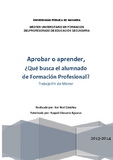Mostrar el registro sencillo del ítem
Aprobar o aprender: ¿qué busca el alumnado de Formación Profesional?
| dc.creator | Neri Sánchez, Iker | es_ES |
| dc.date.accessioned | 2014-07-30T06:56:41Z | |
| dc.date.available | 2014-07-30T06:56:41Z | |
| dc.date.issued | 2014 | |
| dc.identifier.uri | https://hdl.handle.net/2454/11346 | |
| dc.description.abstract | Finalizados los estudios, se da por hecho que quien se titula posee los conocimientos específicos de dicha materia, ya que sin ellos no sería capaz de superar exámenes hasta conseguir el título en cuestión. Pero… ¿Es siempre esto cierto? Muchas veces nos encontramos con que realmente no sabemos sobre lo que deberíamos saber. Esto puede ser debido a que la motivación durante los estudios no fue adecuada ni suficiente, porque el aprendizaje se centra en casos muy concretos o por otros factores. Mediante un cuestionario repartido a estudiantes de Formación Profesional, se ha tratado de analizar si estos realmente quieren aprender conocimientos o si simplemente se esfuerzan para conseguir el título del ciclo. Si bien es cierto que los resultados obtenidos no permiten generalizar tajantemente sobre si lo que buscan es aprobar o aprender, sí que hay ciertos factores, como la información que los propios alumnos tienen sobre sus estudios, que han demostrado tener influencia sobre esta disyuntiva. | es_ES |
| dc.description.abstract | Finished the studies, we take for granted that the graduated possesses the specific skills on the subject, since without them he would not be capable of overcoming examinations up to obtaining the title. But is this always true? Often we see that really we do not know what we should know. This can be because the motivation during the studies was not sufficient, because learning focus on concrete cases or for other factors that I have tried to find out. By means of a questionnaire distributed to students of "Vocational Education", I have tried to analyze if these really want to learn or if simply they exert themselves to obtain the title, as well as the motives that helps the student to choose one option or another. Although it is true that the obtained results do not allow to generalize about what they are finding, to pass or to learn, it is certain that there are factors, like their own information regarding the study, which have proved to have an influence on this dilemma. | en |
| dc.format.mimetype | application/pdf | en |
| dc.language.iso | spa | en |
| dc.subject | Aprobar | es_ES |
| dc.subject | Aprender | es_ES |
| dc.subject | Influencias | es_ES |
| dc.subject | Aplicación práctica | es_ES |
| dc.subject | Motivación | es_ES |
| dc.title | Aprobar o aprender: ¿qué busca el alumnado de Formación Profesional? | es_ES |
| dc.type | Trabajo Fin de Máster/Master Amaierako Lana | es |
| dc.type | info:eu-repo/semantics/masterThesis | en |
| dc.date.updated | 2014-07-22T07:31:16Z | |
| dc.contributor.affiliation | Facultad de Ciencias Humanas y Sociales | es_ES |
| dc.contributor.affiliation | Giza eta Gizarte Zientzien Fakultatea | eu |
| dc.description.degree | Máster Universitario en Profesorado de Educación Secundaria por la Universidad Pública de Navarra | es_ES |
| dc.description.degree | Bigarren Hezkuntzako Irakasletzako Unibertsitate Masterra Nafarroako Unibertsitate Publikoan | eu |
| dc.rights.accessRights | info:eu-repo/semantics/openAccess | en |
| dc.rights.accessRights | Acceso abierto / Sarbide irekia | es |
| dc.contributor.advisorTFE | Chocarro Eguaras, Raquel | es_ES |


